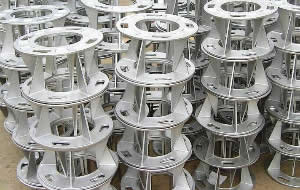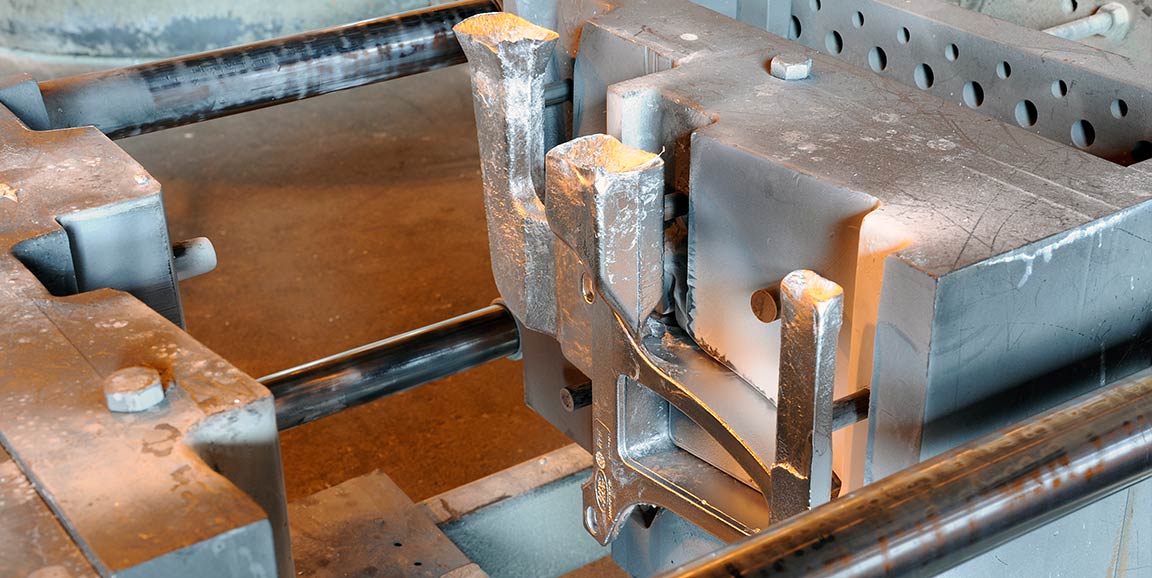How Aluminum Foundry Powers Sustainable and Eco-Friendly Manufacturing
Discover the Benefits of Aluminum Casting in Modern Manufacturing
Aluminum casting has become a crucial procedure in modern-day production. Its lightweight yet durable nature presents considerable advantages for numerous industries. The ability to achieve detailed designs and preserve limited resistances includes to its charm. aluminum casting. In addition, the cost-effectiveness and ecological advantages make it a sustainable choice. As producers seek ingenious options, the role of aluminum casting remains to evolve. What specific applications and benefits await exploration in this vibrant area?
Light-weight Yet Solid: The Benefits of Aluminum
Although numerous materials are made use of in production, aluminum stands out due to its impressive mix of light-weight properties and exceptional strength. This special quality makes aluminum a perfect choice for various applications, specifically in sectors such as automobile, aerospace, and building. Its reduced density enables much easier handling and transport, contributing to minimized power consumption throughout production and setting up processes.
Aluminum's strength-to-weight ratio is remarkable, allowing makers to produce long lasting elements without including unnecessary mass. This particular is especially useful in fields where weight decrease can bring about improved gas efficiency and total performance. Additionally, aluminum's resistance to corrosion improves the longevity of items, further strengthening its allure in modern manufacturing.
Ultimately, the light-weight yet solid nature of aluminum placements it as a recommended material, cultivating advancement and efficiency across multiple fields. Producers increasingly acknowledge that these advantages can bring about significant developments in style and capability.
Precision and Complexity in Design
As producers welcome the capabilities of aluminum casting, they uncover brand-new methods for precision and intricacy in layout. This manufacturing procedure enables the production of complex forms and thorough features that typical methods typically have a hard time to achieve. The fluidness of liquified aluminum allows it to load complex molds, resulting in elements with tight resistances and great surface area finishes.
This precision is particularly useful in sectors such as aerospace and vehicle, where precise requirements are necessary for performance and safety and security. Aluminum casting also accommodates cutting-edge designs that improve capability without compromising structural stability.

Cost-Effectiveness and Performance
Cost-effectiveness and effectiveness are vital considerations for makers exploring aluminum casting as a manufacturing approach. Aluminum casting deals considerable cost advantages due to its lower material costs compared to other metals (Aluminum Foundry). The lightweight nature of aluminum lowers shipping and handling expenditures, and its superb thermal conductivity permits quicker cooling times throughout the casting process, boosting overall production rate
In addition, aluminum's flexibility makes it possible for makers to create intricate forms and layouts, minimizing the need for extra machining or assembly. This streamlining of manufacturing not only minimizes labor prices but likewise reduces lead times, permitting companies to react quickly to market demands.
In addition, the sturdiness and deterioration resistance of aluminum castings contribute to longer product life expectancies, minimizing substitute expenses over time. Therefore, manufacturers can accomplish a balance of top quality result and decreased operational costs, making aluminum casting a progressively appealing choice in modern-day manufacturing.
Ecological Sustainability of Aluminum Casting
Aluminum casting stands apart as an eco lasting production alternative, specifically as a result of its recyclability and minimized eco-friendly impact. The procedure enables the efficient use aluminum, a product that can be recycled forever without losing its buildings. This particular substantially decreases the demand for virgin aluminum, thus decreasing and saving all-natural resources power consumption related to removal and handling.

Applications Throughout Industries: From Automotive to Aerospace
While varied industries remain to look for innovative products for production, aluminum casting has shown to be a versatile remedy across fields such as automotive and aerospace. In the automobile market, look at these guys aluminum castings add to lightweight lorry layouts, boosting gas effectiveness and performance. Parts like engine blocks, transmission real estates, and wheels take advantage of aluminum's strength-to-weight ratio.
In aerospace, aluminum casting plays a considerable duty in producing complicated components that require high resilience and reduced weight. Aircraft elements such as braces, landing gear, and structural frameworks make use of aluminum for peak performance and why not try here security.
The adaptability of aluminum casting allows it to cater to various other industries, including customer electronics, marine, and commercial machinery. This flexibility not only fulfills the specific requirements of different applications but likewise supports continuous development in making procedures. As a result, aluminum casting stays a vital player in modern manufacturing throughout various markets.
Regularly Asked Questions
Exactly How Does Aluminum Casting Contrast to Other Steel Casting Processes?
Aluminum casting offers exceptional strength-to-weight ratios, faster cooling rates, and outstanding deterioration resistance contrasted to various other metal casting procedures. These advantages make it optimal for various applications, boosting efficiency and performance in production.
What Are the Normal Lead Times for Aluminum Casting Projects?
Typical preparation for aluminum casting tasks range from 2 to 8 weeks, depending on factors such as intricacy, order dimension, and manufacturing capability. Effective planning can assist decrease hold-ups and enhance project timelines.
Can Aluminum Casting Be Used for Intricate Layouts?
Aluminum casting can without a doubt accommodate complex designs. Precision aluminum casting. Its fluidness permits thorough patterns and forms, making it ideal for complex parts in various industries. This versatility boosts style freedom while maintaining structural integrity and performance
What Post-Processing Options Are Available After Aluminum Casting?
Post-processing options for aluminum casting consist of machining, polishing, surface treatments, anodizing, and welding. These methods enhance the coating, enhance dimensional precision, and increase corrosion resistance, therefore optimizing the final product's performance and visual allure.
Just How Do Temperature Adjustments Influence Aluminum Casting Top Quality?
Temperature modifications greatly influence aluminum casting quality by affecting fluidness, solidification prices, and possible issues. Rapid cooling can bring about boosted brittleness, while too much heat may cause warping click to investigate or incomplete filling of mold and mildews during casting.
Aluminum casting has emerged as a pivotal procedure in modern production. As producers embrace the abilities of aluminum casting, they find new methods for precision and complexity in style. Aluminum casting procedures typically generate fewer greenhouse gas exhausts contrasted to various other steel casting methods. While diverse sectors proceed to seek innovative materials for manufacturing, aluminum casting has actually shown to be a flexible solution across markets such as automobile and aerospace. In the vehicle market, aluminum spreadings contribute to light-weight automobile designs, boosting gas efficiency and performance.